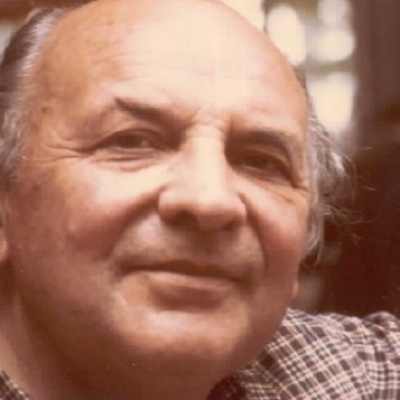
A.L. Lloyd
by Bruce Eder A.L. Lloyd is probably not the name that comes to mind first when the subject of English folk music comes up -- at least not for anyone under the age of 40. As a singer, collector of folk songs, and arranger, however, Lloyd is one of the most important 20th-century figures in English folk music, in many ways Britain's answer to the Weavers' Lee Hayes or Pete Seeger. Born Albert Lancaster "Bert" Lloyd, A.L. Lloyd was the son of an East Anglian fisherman, born in London during the first decade of the 20th century. He learned numerous songs from his parents, especially his father, but didn't become actively interested in folk music until after he emigrated to Australia in the 1920s, where he mostly made his living by "sheepminding" and collected lots of bush ballads during the nine years he spent there. Lloyd subsequently went to sea and learned far many more songs. He returned to England in 1935 with some 500 songs collected and a deep and abiding insterest in folk songs. In 1937, he went to sea with a whaling fleet, sailing to Antarctica and learning more sea shanties along the way. After returning to England, he chanced to hear a program about unemployment in America, and suggested a similar program to the BBC, which led to his being employed as a scriptwriter and reporter. In 1944, he published The Singing Englishman: An Introduction to Folk Song, the first serious volume on the folk songs of England in nearly 40 years. In 1947, Lloyd unexpectedly began a singing career when he won the National Folk Singing Contest. In 1952, Lloyd published his first collection of folksongs and ballads, Come All Ye Bold Miners, but continued to be deeply involved in radio as well, including the series Ballads and Blues, which included performances by Big Bill Broonzy, Alan Lomax, Jean Ritchie, and Ewan MacColl, and eventually to a long-term partnership with MacColl. Lloyd began his recording career during the 78-rpm era with "The Banks of the Condamine"/"Bold Jack Donahue" on the Topic label, but it was during the 1950s, with albums recorded in collaboration with MacColl, in the Radio Ballads series, that he entered the long-playing era. In 1956, Lloyd made a film appearance in the role of the shantyman, singing in the inn where Ishmael goes to sign aboard the Pequod in John Huston's 1956 film of Moby Dick. Lloyd concertized throughout England, and also made numerous appearances in radio and television, becoming one of the country's leading authorities on folk songs and folk dance. Lloyd also made field recordings throughout the 1950s of native singers of Romanian, Bulgarian, and of Albanian folk songs, many of which were released on the Topic label. Most important of all, in terms of English song, he collaborated with composer Ralph Vaughan Williams (1872-1958) in the editing of The Penguin Book of English Folk Songs (published 1959), which became the best-selling reference book in the field (50,000 copies in print by the 1980s). During the early '60s, Lloyd became a mentor to the entire new generation of folksingers, recording for Topic with accompaniment by Martin Carthy, Dave Swarbrick, Anne Briggs, and Frankie Armstrong, even as his books provided Carthy and Swarbrick -- and their eventual colleagues in Fairport Convention and Steeleye Span -- with the core of their repertory. Carthy, in particular, built on Lloyd's work while crediting him fully and prominently. Lloyd's own recordings consisted of old drinking songs, sea shanties, labor songs, and the entire range of material he'd learned from Australia to Antarctica and back again. Lloyd's work as a performer was dedicated to preserving the authentic performing traditions of the folk song in its native environment. His style of singing is rough-hewn and direct, and his use of language is uncensored and forceful, with none of the prettified adaptations typical of more pop-oriented recordings of folk songs and sea shanties. Some 40 years older than most of the folksingers who achieved popularity in the 1960s, his music sounds as though it is of a different age from the work of, say, Martin Carthy, or Bob Dylan, or even Woody Guthrie, and worlds apart from the performances of Steeleye Span or Fairport Convention.
